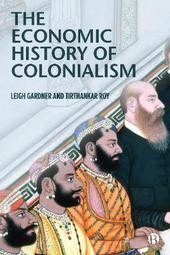
|
The Economic History of Colonialism
Hardback
Main Details
| Title |
The Economic History of Colonialism
|
| Authors and Contributors |
By (author) Leigh Gardner
|
|
By (author) Tirthankar Roy
|
| Physical Properties |
| Format:Hardback | | Pages:244 | | Dimensions(mm): Height 234,Width 156 |
|
| Category/Genre | Colonialism and imperialism
Economic history |
|---|
| ISBN/Barcode |
9781529207637
|
| Classifications | Dewey:325.34 |
|---|
| Audience | | Professional & Vocational | | General | |
|---|
| Illustrations |
3 Maps; 3 Tables, black and white; 4 Illustrations, black and white
|
|
Publishing Details |
| Publisher |
Bristol University Press
|
| Imprint |
Bristol University Press
|
| Publication Date |
15 July 2020 |
| Publication Country |
United Kingdom
|
Description
This pioneering text provides a concise and accessible resource that introduces key readings, builds connections between ideas and helps students to develop informed views of colonialism as a force in shaping the modern world. Debates about the origins and effects of European rule in the non-European world have animated the field of economic history since the 1850s. With special references to European colonialism of the nineteenth and twentieth centuries in both Asia and Africa, this book critically reviews the literature on colonialism and economic growth, covers a range of different methods of analysis and offers a comparative approach, as opposed to a collection of regional histories, deftly weaving together different themes. With debates around globalisation, migration, global finance and environmental change intensifying, this authoritative account of the relationship between colonialism and economic development makes an invaluable contribution to several distinct literatures in economic history.
Author Biography
Leigh Gardner is Associate Professor of Economic History at the London School of Economics and Research Associate in African Economic History at Stellenbosch University. Tirthankar Roy is Professor of Economic History at the London School of Economics.
Reviews"The authors provide a clear and balanced guide to a burgeoning literature. Emphasizing diversity of outcomes, they consider how colonizers and colonized stimulated or hindered their respective economies, in the light of environmental constraints." William G. Clarence-Smith, SOAS University of London "This book gives a nuanced view of how colonial rule was not merely intended as an exploitative tool but was a combination of the empire's desire for power, the intended or unintended consequences of their policies as well as local factors." LSE Review of Books
|